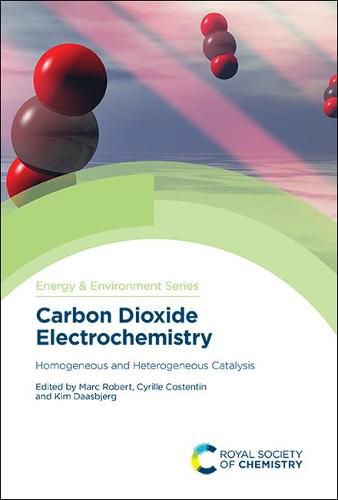Readings Newsletter
Become a Readings Member to make your shopping experience even easier.
Sign in or sign up for free!
You’re not far away from qualifying for FREE standard shipping within Australia
You’ve qualified for FREE standard shipping within Australia
The cart is loading…






Conversion of light and electricity to chemicals is an important component of a sustainable energy system. The exponential growth in renewable energy generation implies that there will be strong market pull for chemical energy storage technology in the near future, and here carbon dioxide utilization must play a central role. The electrochemical conversion of carbon dioxide is key in achieving these goals. Carbon Dioxide Electrochemistry showcases different advances in the field, and bridges the two worlds of homogeneous and heterogeneous catalysis that are often perceived as in competition in research. Chapters cover homogeneous and heterogeneous electrochemical reduction of CO2, nanostructures for CO2 reduction, hybrid systems for CO2 conversion, electrochemical reactors, theoretical approaches to catalytic reduction of CO2, and photoelectrodes for electrochemical conversion. With internationally well-known editors and authors, this book will appeal to graduate students and researchers in energy, catalysis, chemical engineering and chemistry who work on carbon dioxide.
$9.00 standard shipping within Australia
FREE standard shipping within Australia for orders over $100.00
Express & International shipping calculated at checkout
Conversion of light and electricity to chemicals is an important component of a sustainable energy system. The exponential growth in renewable energy generation implies that there will be strong market pull for chemical energy storage technology in the near future, and here carbon dioxide utilization must play a central role. The electrochemical conversion of carbon dioxide is key in achieving these goals. Carbon Dioxide Electrochemistry showcases different advances in the field, and bridges the two worlds of homogeneous and heterogeneous catalysis that are often perceived as in competition in research. Chapters cover homogeneous and heterogeneous electrochemical reduction of CO2, nanostructures for CO2 reduction, hybrid systems for CO2 conversion, electrochemical reactors, theoretical approaches to catalytic reduction of CO2, and photoelectrodes for electrochemical conversion. With internationally well-known editors and authors, this book will appeal to graduate students and researchers in energy, catalysis, chemical engineering and chemistry who work on carbon dioxide.